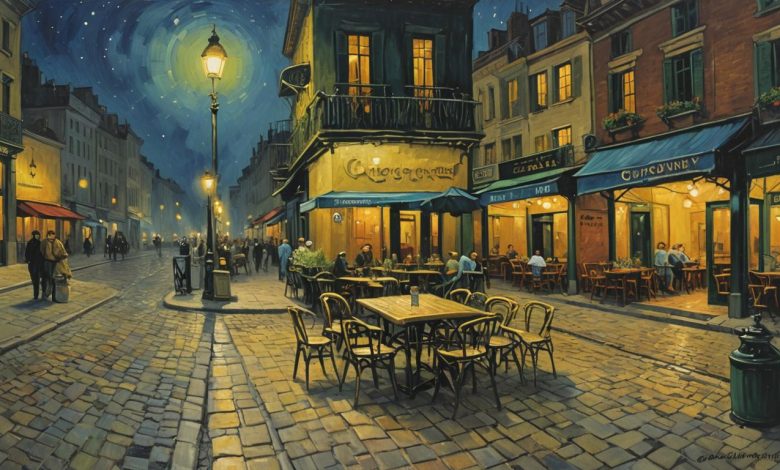The Power of Letting Things Happen: JoMO


I’ve always been intrigued by this painting-Café Terrace at Night. When I first saw this piece, I remember feeling sadness with hints of loneliness. Then I decided to look up its meaning and story, but what I came across was not the thing I expected. This café was a place of gathering and therefore, symbolized joy, connection, and bliss. The colors used in the painting, shades of yellow and orange, also represented happiness. I wondered why I was feeling melancholy when I spot this artwork, and that’s when I realized it was because of FoMO.
What is FoMO?
FoMO is an acronym that stands for “fear of missing out”. Cambridge Dictionary (2020) defines FoMO as the anxiety we experience when exposed to events we are not part of. To illustrate, it is the idea that others are having fun, living their best lives while you are in bed scrolling their posts. What I felt when looking at the painting was close to this one. Everyone is enjoying their coffee, and having a fun conversation, while I kept looking at them from afar and can’t help but feel envious.

Why Do We Feel FoMO?
Though there are several reasons for FoMO, the most important one is social media. According to the Self-Determination Theory, interpersonal relatedness is a significant component of one’s overall well-being (Deci&Ryan, 2017). It is the meaningful connection that involves appreciation of other’s presence and opinions. Thanks to social media, we are now exposed to a great deal of information about what others are doing in their lives, which nourishes the concept of interpersonal relatedness (Gupta&Sharma, 2021). However, being exposed to this amount of information comes with consequences, mainly the stress due to the lack of information.
On the other hand, psychoanalysts think that self-determination theory only explains the visible aspect of FoMO, yet fails to explain the main cause. Therefore, they suggest we should look at individual’s background, especially their traumas. Karadağ and Akçınar (2019) found that people who experience the feeling of being excluded from others are the ones who faced childhood trauma and questioned their worth. Thus, they try to control their environment as a coping mechanism to eliminate stress.
Now that we uncovered why FoMO takes place, we can move on to the coping skills. So, how are we going to deal with FoMO? To find an answer, we’ll get help form an Ancient Chinese philosophy called “Wu Wei”.

Wu Wei: Effortless Action
Wu Wei refers to the act of non-acting. When explained this way, it may sound a bit confusing. In simpler words, it means to go with the flow rather than go against the flow. In the heart of the philosophy, the motto below lies:
The way never acts, yet nothing is left undone.
Wu Wei does not indicate a passive state, instead it indicates an effortless action. It tells us to concentrate on what we have or do; therefore, encourages us to live in the moment and make the best out of it.
FoMO is the result of our thoughts about what we miss rather than what we focus on. For that reason, changing the way we think of our environment and ourselves is both the simplest and hardest thing we can do. When I looked at the painting, I focused on the people in the background so much that I forgot how beautiful the art was. When scrolling on our social media, we become so involved in others’ lives that we miss our lives. Turning FoMO (fear of missing out) into JoMO (joy of missing out), and simply finding contentment and peace in the moment creates an opportunity to choose ourselves. Hence, both FoMO and JoMO give us two options: be either active in your life or passive in others’ lives. The choice is ours to make. I’d like to leave with a quote from Portuguese poet and writer Fernando Pessoa:
I exist unconsciously, and I’ll die unwillingly. I am the interval between what I am and what I am not, between what I dream and what life has made of me.
References
Cambridge Dictionary. (2020). FOMO. https://dictionary.cambridge.org/dictionary/english/fomo
Deci, E. L., & Ryan, R. M. (2017). Self-determination theory: Basic psychological needs in motivation, development, and wellness. Guilford Publications. https://doi.org/10.7202/1041847ar
Fear of missing out. (n.d.). Time of Central.
Gupta, M., & Sharma, A. (2021). Fear of missing out: A brief overview of origin, theoretical underpinnings and relationship with mental health. World Journal of Clinical Cases, 9(19). 4881-4889. https://doi.org/10.12998/wjcc.v9.i19.4881
Karadağ, A., & Akçınar, B. (2019). Üniversite öğrencilerinde sosyal medya bağımlılığı ve psikolojik semptomlar arasındaki ilişki. Bağımlılık Dergisi, 20. 154-166.
Neill, D. (2020). Finding the Present Moment.
Van Gogh, V. (1888). Café Terrace at Night. Kröller-Müller Museum, Otterlo, Netherlands.





